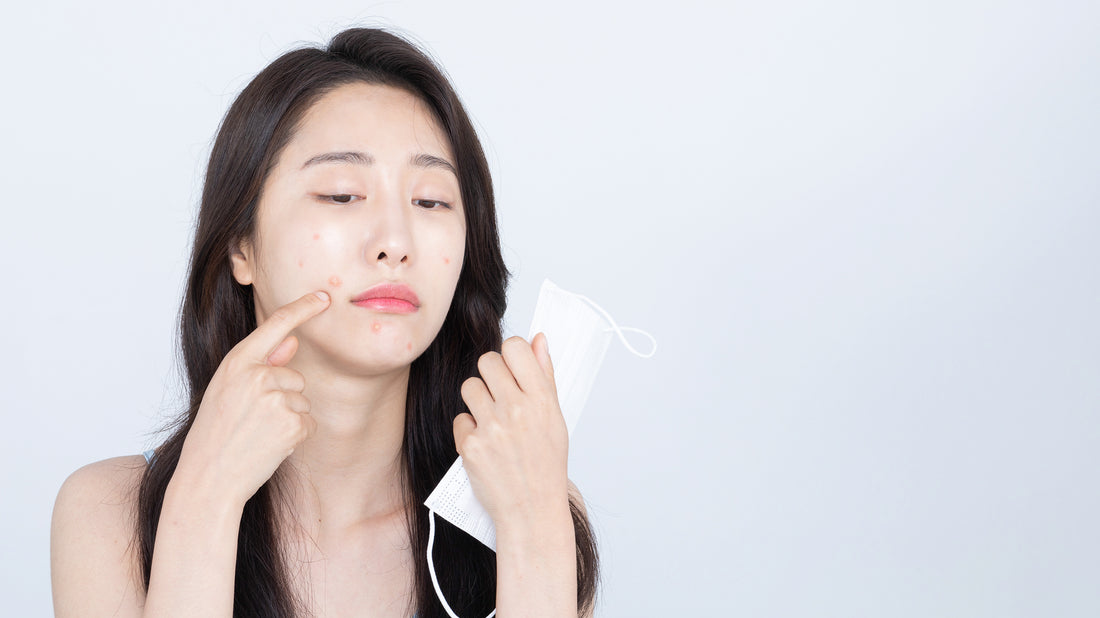
How to prevent and treat mascne
Mascne is simply acne caused by wearing a face mask. Due to the current situation, it is a widespread skin problem nowadays. In this blog post Tomorrowlabs explains what causes this phenomenon and how to get it under control.
What are typical characteristics of mascne?
You may have noticed an increased amount of red spots, bumps, or pimples on the areas of your face that is covered by a mask. It doesn't matter if you're someone who breaks out regularly or if you usually have near-perfect skin. Mask acne, or mascne for short, can affect anyone.
Unfortunately, the solution cannot be as easy as stoping wearing a mask. However, if you treat your skin properly, you should be able to control mascne and avoid major breakouts.
What causes mascne?
Everyone's skin reacts differently to products and stressors. Like regular acne, several things can lead to mask acne: not washing or changing your mask often enough, washing it with a harsh detergent, or using the wrong skincare products.
Masks prevent saliva and other droplets to be released when you breathe, speak, cough or sneeze from becoming airborne and potentially transmitting Covid-19 (or other diseases). However, this also means that they trap moisture and bacteria inside and bring them more into contact with the skin. Wearing masks prevents water from escaping, resulting in a humid environment which is ideal for acne-causing bacteria to thrive.
What can you do against mascne?
If you don't wash your mask, these bacteria will seep into your skin more. On the other hand, frequent washing can also lead to breakouts. Your skin can react to the detergent you use. Try a gentle, fragrance-free cleanser. Ideally, you should change your mask after each use, at least if you have worn it for a long time.
If you usually wear makeup, avoid putting it on the areas that the mask will cover. Keep your face clean and moisturized, and don't exfoliate too much. People often think they need to dry out acne, but drying out your skin can actually lead to more breakouts. Even if you have oily skin, keeping your skin barrier intact is essential. Moisturized skin prevents chafing and rashes.
Thoroughly but gently cleanse your face before putting on a mask and after removing it. Use gentle cleansers that will efficiently remove the oil, such as Tomorrowlabs Sensitive Face Wash. It is a mild cleansing gel with zinc. Zinc protects the collagen-forming cells and promotes the regeneration of damaged skin. It helps treat local inflammation, reduces clogged pores and optimizes the cell membrane.
Ideally, such cleansing should be combined with skincare products that specifically moisturize, reduce inflammation, protect and repair the skin barrier. Drying out your face can potentially lead to more breakouts. Keep your face hydrated with a non-comedogenic moisturizer. Tomorrowlabs Hydragel Moisturizer is perfect for skin that tends to be dry and sensitive.

To reduce or prevent inflammation and shorten the lifespan of pimples, we recommend:
Tomorrowlabs Impurity Control. It contains natural Syringa Vulgaris Extract, Kaolin and Salicylic Acid that help to kill bacteria, decrease skin inflammation and soothe skin sensitivity. Tomorrowlabs Redness Halt is specially formulated to reduce skin redness. With an anti-inflammatory team of 3: Centella Asiatica extract, bisabolol and allantoin. Last but not least, Tomorrowlabs Repair Stimulant helps repair irritated skin. Regenerative HSF technology paired with dexpanthenol and marigold extract is ideal for treating skin areas affected by pimples.
Generally speaking, if you're prone to stress-related outbreaks, an international pandemic is certainly not something conducive. Try your best to relax. One thing is clear: you must continue to wear a mask while you are in public. But if you don't have to be in public, stay home and let your skin breathe.